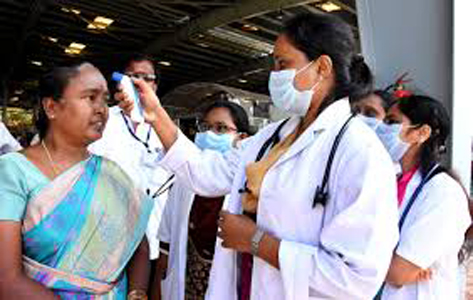NE NEWS SERVICE
GANDHINAGAR, MARCH 25
Even as the state government has intensified its preventive health drive, the number of COVID-19 cases in Gujarat went up to 39 as four more people, one of them with travel history abroad, tested positive for the new coronavirus on Wednesday, a health department official said here.
https://twitter.com/CMOGuj/status/1242850684640169985?s=20
On Wednesday, one new case was reported each from Ahmedabad, Surat, Rajkot, and Vadodara, principal secretary (health) Jayanti Ravi told reporters here.
Of these fresh infections, one patient has a history of travelling to Dubai in recent times, while the others are cases of local transmission of the viral disease, she said.
I urge residents of Gujarat to use Whatsapp Coronavirus helpline to receive the latest updates and authentic information from the State Health Dept. To begin, just Whatsapp Namaste on 7433000104. I commend Officers of Govt of Gujarat, Facebook India & Whatsapp for this initiative
— Vijay Rupani (Modi Ka Parivar) (@vijayrupanibjp) March 25, 2020
With this, the total number of cases in Ahmedabad stands at 14, Surat and Vadodara at seven each, Gandhinagar at six, Rajkot four and Kutch one, she said.
Ravi said the health department has conducted surveillance and tracking of over 1.60 crore people in the wake of coronavirus outbreak, and the entire state population will be covered in the coming weeks under a special programme.
“Under the Integrated Disease Surveillance Programme, the state government has so far covered 1 crore 60 lakh and 62 thousand persons in both urban and rural areas.
“This has been done as part of surveillance of areas from where positive (COVID-19) cases, as well as cases of Severe Acute Respiratory Infection (SARI), have been reported,” she said.
The senior bureaucrat said the government has also registered FIRs against as many as 147 persons for violating quarantine protocol.
As many as 430 persons violating home quarantine protocol were shifted to government-run facilities, she said.
Ravi said 15,468 persons with foreign travel history have been tracked based on data provided by the central government and more are being tracked and quarantined.
As many as 20,688 people are under quarantine in the state, which included 20,220 in homes, 430 in government and 38 private-run facilities, she said.
Over 350 detained in 24 hrs
Over 350 people were detained for violating the COVID-19 lockdown in the last 24 hours in Gujarat, a senior official said on Wednesday.
Those detained include people who violated home quarantine norms, director-general of police Shivanand Jha said.
While Prime Minister Narendra Modi announced a 21-day nationwide lockdown on Tuesday, Gujarat has been under lockdown since Monday midnight.
મોરબી બી ડીવી. પો.સ્ટે. ટીમને પેટ્રોલીંગ દરમ્યાન મહિલા તેના પુત્ર સાથે દેખાતા, તેમની પુછપરછ કરતા જાણવા મળેલ કે તેમને કિડનીની બિમારી છે અને તેઓ દવાખાને જવા નિકળ્યા છે, પરંતુ લોકડાઉનના લીધે વાહન નથી મળતા. આ જાણી તાત્કાલીક તેઓને પોલીસ વાનમાં નજીકના આયુસદવાખાને પહોંચાડવામાં આવ્યા હતા pic.twitter.com/WqHQ0XyJrv
— Gujarat Police (@GujaratPolice) March 25, 2020
Speaking to reporters in Gandhinagar, Jha said, “police are doing their best to enforce the lockdown strictly. People have also come forward to give their full cooperation to make it a success.” The police and local administration have ensured that essential services, including grocery and medicine shops, are not affected, he said.
“In the last 24 hours, we have lodged 151 cases for lockdown violations and 89 of quarantine violations. In all, we have detained 353 persons across the state,’ the senior officer said.
Just completed a very fruitful meeting with reps of Big Bazaar, Reliance Retail & Other supermarkets
They have all agreed to start Home Delivery of essential goods on a large scale from tmrw in #Ahmedabad
— Vijay Nehra (@vnehra) March 25, 2020
The biggest challenge for the police is to enforce social distancing at grocery stores and supermarkets and to tackle the problem, shop owners were asked to issue tokens to customers to prevent congestion.
Meanwhile, Chief Minister Vijay Rupani and his deputy Nitin Patel chaired a high-level meeting to discuss the present situation and issued necessary orders for a smooth supply of essential commodities, secretary at Chief Minister’s Office Ashwani Kumar said.
At present, around 3 crore litre of milk is being produced in Gujarat every day, of which 55 lakh litre is distributed in the state, he said, adding that 53,000 quintals of vegetables arrive in the markets of Gujarat every day.
“To ensure uninterrupted supply of these essential items, senior officials will be appointed to supervise milk and vegetable supply,” Kumar said.
The police will be roped in to ensure that local vendors do not face any problems while transporting milk and vegetables, he added.
NDDB asks dairy co-ops to ensure continued milk, products supply
The National Dairy Development Board (NDDB) on Wednesday appealed all dairy cooperatives to take adequate measures to ensure the continued supply of milk and its products amid the COVID-19 lockdown.
The Anand-headquartered national dairy board has asked dairy cooperatives to make suitable arrangements for ensuring uninterrupted collection, chilling, transportation and processing of milk and availability of fodder in villages.
“Because of the present COVID 19 pandemic, NDDB has appealed to all dairy cooperatives across the country to take essential measures for the continued supply of milk and milk products to avoid situations of panic buying by consumers,” NDDB Chairman Dilip Rath said in a statement.
In case of any difficulty in maintaining the dairy supply chain, the concerned dairy cooperatives are advised to contact the local authorities, he said.
The lockdown measures may dry up the majority of income sources for the people in rural areas. Hence, milk business may prove to be the only economic lifeline for millions of rural dairy farmers, the NDDB said.
Dairy and milk booths, as well as cold storage and warehousing services, are permitted. Transportation and other logistics services concerning the above are also exempted.
Dairy cooperatives account for the bulk of the organised liquid milk supply to consumers in the country.









